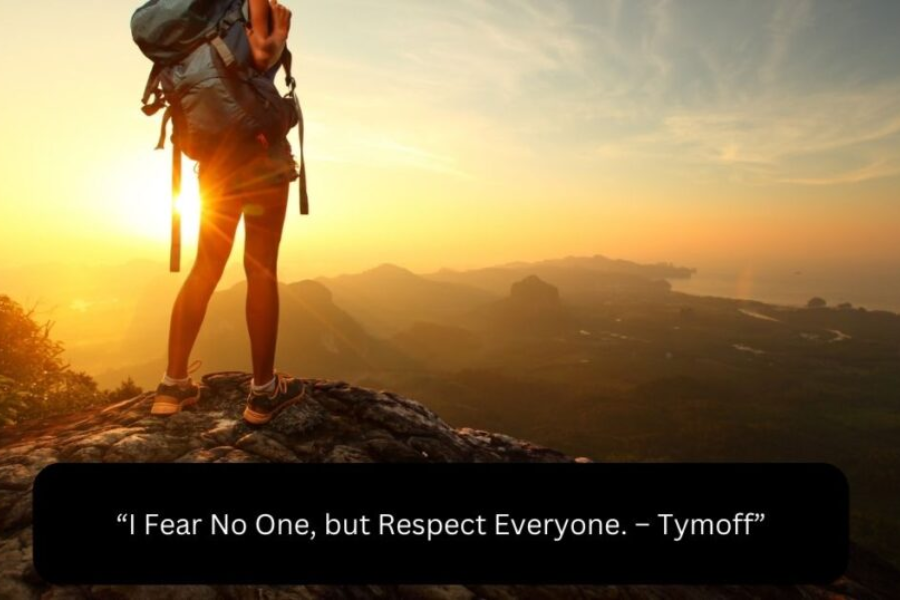I fear no one, but respect everyone. – tymoff
Introduction
In the sea of inspirational quotes, Tymoff’s statement, “I fear no one, but respect everyone,” stands out like a lighthouse, offering a profound philosophy for navigating life’s challenges. This seemingly simple phrase carries a wealth of wisdom, urging us to embody a spirit of unwavering courage while fostering a deep well of respect for ourselves and those around us. But what does it truly mean to fear no one yet respect everyone? Let’s delve into this concept and explore how it can empower us to conquer challenges, build meaningful connections, and live a life of integrity.
The Essence of Fearlessness
The phrase “I fear no one” doesn’t imply a complete absence of fear. Fear is a natural human emotion, an instinctual response to perceived threats. It’s the jolt that warns us of impending danger, the inner voice urging caution. However, Tymoff’s concept of fearlessness goes beyond merely acknowledging fear; it’s about not allowing fear to dictate our actions. It means standing tall even when our knees tremble, taking that crucial first step even when the path ahead is uncertain.
This brand of fearlessness empowers us to embrace challenges head-on. It allows us to confront difficult conversations, pursue ambitious goals, and stand up for our beliefs, even in the face of opposition. Imagine being in a nerve-wracking job interview where the fear of failure looms large. Fearlessness reminds us of our capabilities, enabling us to channel that nervous energy into presenting our skills and experiences with confidence. We don’t shy away from tough questions but instead, answer them with conviction, demonstrating our resilience and unwavering spirit.
Fearlessness is Not Recklessness
However, Tymoff doesn’t advocate for blind recklessness. True fearlessness exists in harmony with the second part of the quote: “Respect everyone.” Fearlessness without respect can easily morph into arrogance or a disregard for boundaries, leading to self-destruction. Respect, on the other hand, serves as the guiding light for our fearlessness. It reminds us that everyone, regardless of their background, beliefs, or experiences, deserves our basic courtesy and consideration.
Respect fosters empathy, allowing us to see the world through another person’s eyes and understand their perspective, even when it differs from our own. This fosters open communication and collaboration. Imagine leading a team project with the fearlessness to challenge the status quo and propose innovative ideas. However, you also respect your team members’ expertise, actively listening to their viewpoints and valuing their unique contributions. This creates a space where diverse perspectives can coalesce into a stronger, more well-rounded solution.
Fearlessness and Respect
The potent combination of fearlessness and respect is especially valuable in leadership roles. A leader who embodies these qualities inspires confidence in their team. They are unafraid to make tough decisions, chart unconventional courses, and navigate uncharted territories. Yet, they also foster a culture of respect, where every voice is heard, and contributions are valued. This environment breeds loyalty and motivation, where individuals feel empowered to think creatively and contribute their best selves.
Consider a leader tasked with delivering difficult news to their team. Fearlessness enables them to be upfront and honest, avoiding sugarcoating the situation. However, their respect for their team members compels them to deliver the news with empathy and clarity, offering support and addressing any concerns. This honesty fosters trust and strengthens the team’s bond, enabling them to navigate the challenging situation together.
The Power of Respectful Communication
In our increasingly polarized world, respectful communication is a critical skill. Fearlessness can help us overcome the fear of expressing our opinions, even when they are unpopular. However, respect ensures that we do so constructively, promoting understanding rather than conflict. It’s about advocating for our beliefs with passion while avoiding personal attacks or inflammatory rhetoric.
Imagine engaging in a heated debate on a social media platform. Fearlessness might compel you to voice your dissent and challenge opposing viewpoints. But respect for the other person guides your communication, focusing on the merits of your argument and using evidence and reason to back your claims. You listen actively to their perspective, seeking to understand their reasoning, even if you disagree.
Practical Steps for Everyday Life
Tymoff’s quote serves as a powerful call to action, but how do we translate this philosophy into tangible steps in our daily lives? Here are some practical ways to cultivate fearlessness:
- Challenge Your Comfort Zone: Stepping outside your comfort zone is a proven way to build confidence and resilience. Start small, perhaps by striking up a conversation with someone new or taking a class on a subject that intimidates you. As you conquer these initial challenges, you’ll gain the momentum to tackle bigger ones.
- Reframe Your Perception of Fear: Fear often whispers doubts and limitations. Challenge these negative thoughts. Ask yourself, “Is this fear truly warranted, or is it holding me back unnecessarily?” Reframe fear as excitement, a sign that you’re pushing your boundaries and venturing into uncharted territory.
- Visualize Success: When faced with a daunting task, take a moment to visualize yourself succeeding. Imagine delivering a compelling presentation, confidently navigating a difficult conversation, or overcoming a seemingly insurmountable obstacle. This mental rehearsal builds confidence and empowers you to face the challenge head-on.
- Celebrate Your Achievements: Acknowledge and celebrate your victories, no matter how small. This reinforces the positive association with taking risks and overcoming challenges, further fueling your fearlessness. Consider commemorating your achievements with something tangible, like a courage medal or a fearless trophy, to remind you of your progress.
Building Bridges of Understanding
Respect is a cornerstone of healthy relationships and a catalyst for positive change. Here are some ways to practice respect in your daily life:
- Practice Active Listening: Truly listen to understand, not just to respond. Pay close attention to what the other person is saying, both verbally and nonverbally. Ask clarifying questions to demonstrate your genuine interest in their perspective.
- Acknowledge Differences: We all come from unique backgrounds and hold diverse beliefs. Embrace these differences as opportunities for learning and growth. Celebrate the richness of human experience and the tapestry of perspectives that make our world so vibrant.
- Assume Positive Intent: When someone says or does something that challenges you, try to assume positive intent. Perhaps they have a different perspective or lack certain information. Offer them the benefit of the doubt and seek to understand their motivation.
- Show Empathy: Put yourself in the other person’s shoes. Try to understand their feelings and experiences. This fosters compassion and creates a foundation for respectful communication.
How Fearlessness and Respect Shape Our World
Tymoff’s quote isn’t just about individual empowerment; it has the potential to create a ripple effect that can transform our communities and the world at large. When individuals cultivate fearlessness and respect, they create more collaborative environments.
Imagine workplaces where diverse ideas are welcomed, and challenges are tackled with a spirit of open communication. Leaders who embody these qualities inspire their teams to reach their full potential, fostering innovation and progress.
Beyond the professional sphere, this philosophy translates to stronger communities. When individuals approach conversations with respect, even on contentious issues, they pave the way for productive dialogue and solutions. This can lead to a more just and equitable society, where everyone feels heard, valued, and empowered to contribute.
How Fearlessness Breeds Authenticity
Fearlessness doesn’t equate to an absence of vulnerability. Tymoff’s message isn’t about portraying an image of invincibility. It’s about acknowledging our vulnerabilities while refusing to let them paralyze us. Sometimes, the most courageous acts involve admitting our fears, expressing our doubts, and stepping outside our comfort zones even when we tremble. This authenticity fosters genuine connection. People are drawn to those who are willing to be real, who share their struggles and triumphs. In a world obsessed with perfection, embracing vulnerability can be a radical act of courage.
Consider a public speaker who confesses their pre-performance jitters. This vulnerability strengthens their connection with the audience, creating a sense of shared humanity. The audience recognizes the speaker’s courage in facing their fear and admires their commitment to delivering their message.
Fearlessness and Failure
The path of fearlessness is inevitably paved with setbacks and failures. Tymoff’s message doesn’t promise a life free of obstacles; instead, it encourages us to confront them head-on. Fearlessness empowers us to view failures not as debilitating defeats but as valuable learning experiences. Every misstep, every rejection, holds the potential to teach us valuable lessons about ourselves, our strengths, and our areas for growth.
Imagine an entrepreneur who pitches their business idea to a panel of investors and receives negative feedback. The initial sting of rejection might be intense, but the fearless spirit urges them to analyze the feedback, identify areas for improvement, and refine their approach. This perseverance increases their chances of success in the future.
Fearlessness and Creativity
Fearlessness is the fuel that ignites creativity. When we silence our fears of judgment or failure, we open ourselves to a world of possibilities. We can explore unconventional ideas, experiment with new approaches, and push the boundaries of the status quo. This willingness to embrace the unknown is the cornerstone of innovation and progress.
Imagine an artist who dares to experiment with a new medium or a musician who composes a piece that defies traditional genres. Their fearlessness allows them to break free from creative constraints and forge a new path. This spirit of exploration not only enriches their own artistic journey but also pushes the boundaries of their respective art forms, inspiring future generations.
The Power of Respectful Disagreement
Respect doesn’t equate to blind agreement. Tymoff’s message encourages us to approach disagreements with respect and understanding. Even when our viewpoints differ radically, respectful dialogue allows us to find common ground and explore alternative perspectives. It’s about acknowledging the validity of another person’s experience even if we don’t fully agree with their conclusions.
Conclusion
Tymoff’s quote, “I fear no one, but respect everyone,” serves as a guiding principle for living with both strength and humility. This mantra encourages us to face life’s challenges with unwavering courage while treating others with the dignity they deserve. By embracing this mindset, we foster personal growth, build resilience, and cultivate relationships grounded in mutual respect.
As we navigate the complexities of life, this philosophy reminds us that fearlessness and respect are not static traits but qualities that evolve with experience. Let this journey of self-discovery and growth inspire you to embody the essence of Tymoff’s words, making them a cornerstone of your interactions and endeavors.
Keep up-to-date with breaking news and updates on glamourtomorrow






